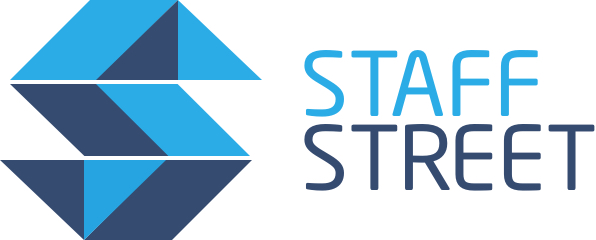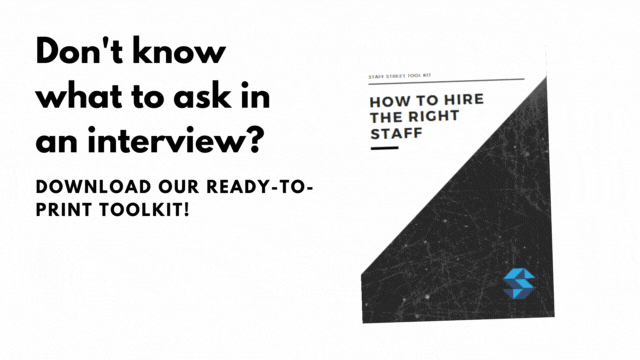As creators of their own destiny, entrepreneurs pour a lot of their time and energy into making something out of nothing. When you invest so much of yourself, it can be a challenge to imagine hiring other people to share that creative space with you. But here’s a fact you probably already know:
Nobody makes it on their own!
While outsourcing isn’t for everyone, it can be a meaningful strategy for entrepreneurs who are ready to expand their world of opportunities.
At Staff Street, part of our process is to help you map your journey. Sometimes, it helps to talk to somebody else in the business to help you get a clear grasp of where you are and what you need. We help businesses identify the roles that need to be filled in the organization to sustain their growth. Then, we connect them with the right people.
Unlike other outsourcing companies, we are committed to finding professionals who not only bring their experience and expertise but who also match the unique and specific needs of our clients.

Staff Street’s Matchmaking Strategy
Hiring other people is an art as much as it is a science. The best way to understand people is to get them talking. In our experience, asking them the standard questions during an interview can yield rehearsed answers. Of course, there’s nothing wrong with practicing what you’re going to say before you go into an interview. But as outsourcing experts, we hire people who are not just good at what they do. We hire people who take the initiative to become essential members of the team. That requires certain qualities that you can’t find on a resume—you have to figure that out for yourself by getting to know your candidates.
We’ve built a system that prioritizes a tripartite of qualities in our hires: expertise + efficiency + communication proficiency.
Keep in mind:
- Be intentional with your questions. Don’t waste people’s time by asking them questions that you’re not interested to learn the answers to. Understand what you’re looking for (e.g. skills-wise, personality-wise, experience-wise, etc.), and ask questions that will help you find those answers. Here are a few to start with.
- Keep it conversational. Find ways to talk about the job without talking about it. At Staff Street, we work with a resourceful team of HR experts who put our candidates at ease, asking thematic questions that get to the heart of a candidate’s expertise, work habits, personality, and communication skills.
Interviews don’t have to be formal all the time, and the best interviews are the ones where we get to know the candidate in a purposeful and genuine way.
How do we hire our experts?

We draw our hires from our strong professional network of the creatives, design, legal, accounting, and administrative professions in the Philippines that we have cultivated over years of business and outsourcing in the country.
Our method for matching hires combines the traditional hiring process with our own customized strategic approach. We conduct competency tests, browse portfolios, and conduct background surveys. But we also gauge for competitive advantage through a series of strategic interviews to map the exceptionalities that the candidates can bring to the table.
Traditional Hiring Process
- Competency test according to professional needs
- Portfolio review
- Background survey
- Proficiency test in language skills and communication tools, including mock calls & speech tests
Customized Strategic Approach
We conduct a series of interviews to identify a candidate’s cognate skills and competitive advantage.
Experience makes all the difference especially when you’re a start-up. People who are more experienced tend to be more knowledgeable and, therefore, more confident in making important decisions. But, sometimes, resumes and CVs don’t reflect the depth of experience of a candidate.
So, at Staff Street, we prioritize conversations with our candidates to find out their cognate skills and related experiences. These provide an intuitive edge that balances experience with potential. A start-up can grow with the input of experienced staff. But it can also do that even more with people who bring differentiating skills and experiences.
Standard Staff Street Questions
- (Starters) What chapter are you in in your career?
- (Depth) What’s the most surprising thing you’ve learned in your line of work?
- (Strengths) What skills or experiences make you stand out?
- (Professional Insight) Walk us through your work process. How has it evolved?
- (Strengths) What’s the most challenging project you’ve ever had to do and how did you get through it?
- (Professional Insight) Is there a project or a job that you’ve done that you wish you had done differently? How would you change it knowing what you know now?
- (Self-Assessment) Based on your experience, what is the hardest part about doing this kind of work? What would make it easier for you to do it?
- (Insight on Strategy) Is there a standard or a practice within your professional field that you wish you could change or improve? What is it? How would you improve it?
- (Specifics) How much experience or familiarity do you have with the industry you’re applying for?
- (Self-Assessment) Based on your certifications, which skills have you been able to apply to your work?
How do we find people who are efficient at what they do?

At Staff Street, we believe that outsourcing improves efficiency. We understand that a lot of factors affecting efficiency rest with the companies themselves. As outsourcing experts, we look at the people factor. We hire people who are the best for the job. But even the best people are shaped by their habits and their circumstances.
Part of our ethos is to enable our candidates to meet their potential by giving them the tools to be more efficient at their jobs. We conduct transparency surveys and test interviews to find out our candidates’ abilities to meet deadlines, follow instructions, collaborate with a team, and construct genuine feedback. Then, we conduct interviews to understand where our candidates are coming from and the factors that influence their productivity and performance.
Standard Staff Street Questions
- (Productivity) What is the most essential part of your day-to-day working environment?
- (Productivity) Which productivity tool has been a game-changer for you? Can you imagine getting the job done without it?
- (Resourcefulness) Discuss strategies for realistic and common scenarios. For example, when you’re pressed for time or you have to come up with solutions for a specific inquiry or problem, what steps do you take? How do you prioritize your tasks?
- (Compatibility) What role in the team do you prefer to play? Are you the leader, organizer, advisor, etc.? What kind of personalities do you work best with and why?
- (Ethics) Can you talk about a time when you made a mistake at work? How did you deal with it?
- (Culture) What did you bring to the teams that you’ve been part of professionally?
- (Ethics) When was the last time you had a major disagreement while working with other people? How did you work through it?
- (Leadership) In your career, what moments of leadership have inspired you the most? What kind of qualities do you want to see in the people that you work for?
- (Culture) How do you handle receiving and giving criticism and feedback?
- (Personality) What do you do outside of work?
- (Personality) What keeps you inspired?
- (Goals) Where do you hope to see yourself in a few years?
Finally, how do we find people who can communicate really well?

Being able to communicate well and efficiently is important for any field of work, but even more so when you’re running a team remotely. It makes all the difference when you’re working with people who are open and consistent.
Like many companies, we examine communication skills using traditional language tests to identify the depth and nuance of the candidate’s grasp of English. Beyond that, it’s important that we hire people who are communicative about their ideas, interests, and concerns. It’s an essential trait when you’re running a company remotely.
Traditional Communications Test
- Language Proficiency
- Communicative Tools Proficiency (i.e. familiarity and ability to communicate intuitively on various productivity platforms)
Open Door Approach
- Engage candidates on the project they’re being hired for
- Discuss plans and concerns about candidacy moving forward
- Keep the door open to connect on other things
At Staff Street, we believe that success in the post-pandemic world will be based on people’s ability to communicate openly and efficiently. That goes for both the client and the candidate. Businesses that are able to communicate their vision well internally and externally are definitely at the head of the pack.
Staff Street Standard Questions
- (Personal Goals) What’s the next step for you in terms of your career? How do you see the company fitting into that development?
- (Openness) What questions do you have for us?
- (Openness) What is your expected salary?
- (Creative Exchange) Explain the day-to-day operations of the company and its general pain points. Ask your candidates, what would you add or change to improve the way things are done?
Interested in finding a match? Reach out and let’s build your team together.


